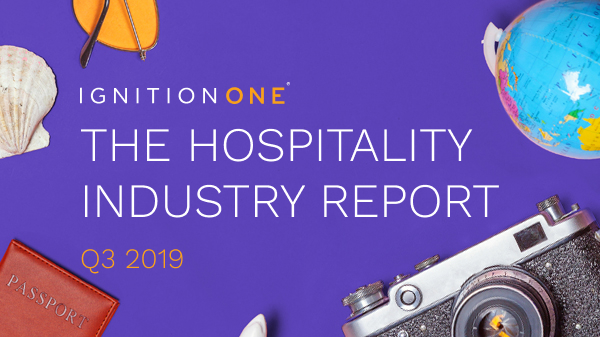
NEW YORK, NY – IgnitionOne, a global marketing technology and services leader with a focus on the travel and hospitality sector, has released its Q3 2019 Hospitality Industry . The report reviews key industry criteria including conversion rates, booking values, site activity, and the influence of third-party websites (such as billboard effect data, OTA and metasearch engines) by business and leisure for all hotel tiers: Luxury, Upscale, Midscale, Economy and Extended Stay.
The report revealed that despite a 2.5% increase in cart abandonment rates, 27K hotel properties saw 6.83M bookings resulting in $1.81B in booking revenue last quarter – a 6% increase from Q2. Economy and Midscale had the lowest cart abandonment rates across hotel tiers, yet Extended Stay and Midscale hotels continued to see a spike in conversion rates. Upscale and Luxury tiers flatlined, keeping them below the average across all segments.
The report uncovered the impact of third-party websites including OTA and metasearch engines across hotel tiers:
- Over the last four quarters, third-party websites have been the driving force behind site visitors for Midscale and Economy hotels, seeing 60% and 40% more traffic than in the Extended Stay and Upscale segments
- Economy and Upscale saw a drop in the percentage of site visitors from these sources in Q3 compared to Q2
- Luxury experienced the least variation in site traffic due to third-party websites, yet had a larger percentage of bookers as a result of these sources
“The goal of our quarterly reports is to grant hotel marketers insight into what’s driving the industry and how to identify areas of opportunity,” said Eric Bamberger, SVP of Hospitality at IgnitionOne. "This quarter was telling to the frequency in which customers are using third-party websites and metasearch engines to identify and compare booking rates and availability when traveling. However, that doesn’t necessarily result in positive conversion. Following a busy summer travel season and as we enter into holiday territory, marketers should prioritize a personalized approach to influence direct bookings.”
Additional highlights from the report include:
- The report saw a trend in summer getaways, with a notable spike in Independence Day and Labor Day bookings; August 30th garnered over 15% more bookings than the average summer Friday – more than any day of the year other than Memorial Day
- When looking at average booking value and daily rates, September showed to be an optimal time for prospective travelers to book trips at moderately discounted rates
- For the second quarter in a row, average lead times are down across all hotel segments for business, leisure and extended trips
- Shrinking lead times, increasing latency and increasing time spent on site in Q3 indicates travelers are doing more research prior to completing bookings than earlier this year
- 4 out of 5 hotel segments saw a 2-6% increase in bookings completed less than a week before check-in.